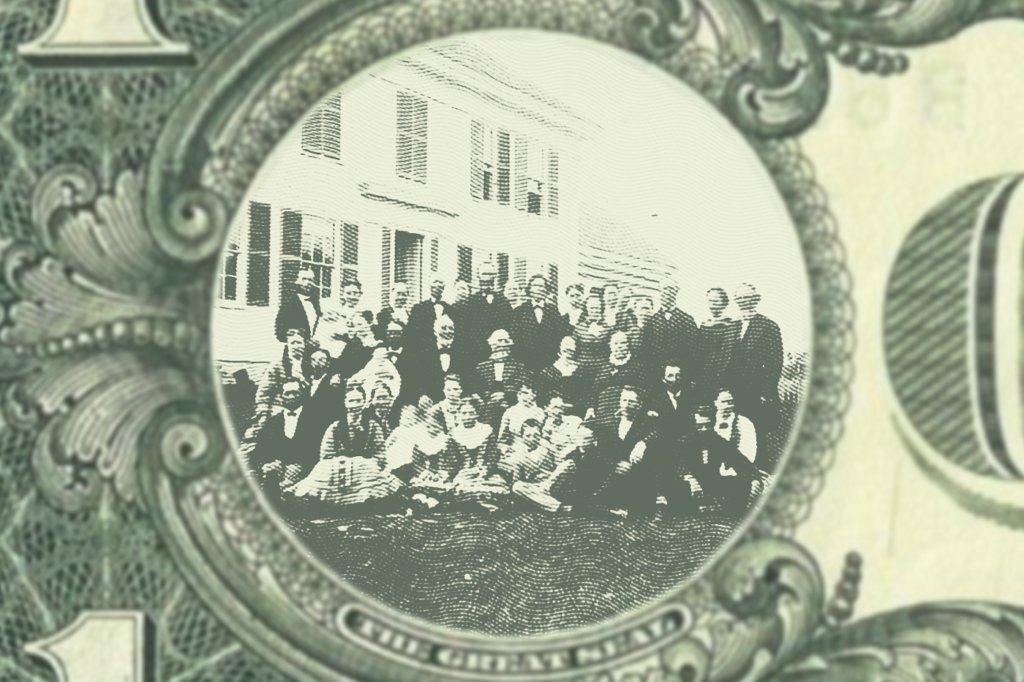Editors’ Note: Elayne Allen’s essay is the final in our series Reimagining Wealth. This series critically examines modern notions about wealth, the cross-generational practices surrounding wealth and property, and the interplay between wealth and family formation. Ms. Allen’s essay offers an overview of how the series points to a new vision of wealth grounded in familial and generational obligations.
On Monday, December 12 at 12:00 p.m. ET, we will have a webinar discussion via Zoom with all the authors. Register here.
This week, Public Discourse has run four phenomenal essays by Mark T. Mitchell, Jeff Polet, Clara Piano, and Patrick Brown for our “Reimagining Wealth” series. This series has aimed to provide some needed clarity about our assumptions about how wealth shapes our culture, politics, and selves.
Start your day with Public Discourse
Sign up and get our daily essays sent straight to your inbox.In modern societies, wealth is more stratified than ever because our economy is stratified. Wealth can be currency (crypto or otherwise), property, housing, and a variety of other assets. Wealth stratification has created many wondrous technologies that improve life. But one downside of it, as these essays suggest, is that wealth has become disaggregated from familial and intergenerational obligations. In adulthood, most of us become economically independent of our families; but this self-sufficiency is isolating and lonely. Wealth is not tied to land or long-lasting material things, nor is it transmitted across generations; it is fluid, shapeshifting, and usually doesn’t extend beyond the horizon of our own lives and personal needs. This series offers fresh ways of imagining wealth so that it becomes more conducive to cultural vibrancy and helps us flourish.
Wealth’s disassociation from intergenerational and familial ties has significant consequences. Our primary way of thinking about wealth is as individual possession, or a possession we earn and use to provide to those in our immediate care (i.e., our nuclear family). In this view, wealth is the reward of effort and talent, and downstream of our supposed meritocracy. I say supposed because meritocracy is largely an illusion. Even so, many of our cultural reflexes are based on a presumptive meritocracy: we all must earn our wealth by the sweat of our brow and economically valuable skills. Socioeconomic standing roughly correlates with effort plus talent.
To be clear, earning money is not necessarily bad. It facilitates virtues such as industry and honesty. The problem arises when we think of wealth as only the product of our effort and talent. This fosters what Mark Mitchell called in his essay the “absolute ownership” model of wealth. Even the word “earnings” suggests that we deserve it and that it is solely ours. Mitchell describes the absolute owner view this way: “What I possess is mine without qualification. I can do with my property whatever I choose. The horizon of my concerns extends no further than the horizon of my own life or the duration of my desires. Property, then, is seen primarily as a means by which I am satisfied.” There are no in-built obligations to future generations; wealth is primarily a matter of consumption according to preference.
Many of our cultural reflexes are based on a presumptive meritocracy: we all must earn our wealth by the sweat of our brow and economically valuable skills.
Our cash-based economy only reinforces the idea that we are absolute owners of our wealth. Jeff Polet notes in his essay that cash only has “extrinsic” value. Unlike land, durable goods, or product wealth, cash can function as an extension of our will; it is completely shapeless and can summon forth any product so long as we have enough of it. But wealth as land or durable things requires us to accommodate ourselves to its demands for it to remain a valuable asset. A cash-based economy also renders us socially fluid. Polet writes: “Americans, not having familial wealth to draw upon, thus relentlessly engage in earning money. But money only has extrinsic value. . . . Money takes genuine wealth and liquidates it, and in the process renders the social world fluid.” Everyone’s pursuit of cash means that wealth is unfettered from hometowns, property, and family. An economy of cash goes hand in hand with the idea that people are autonomous and unencumbered: if we have sufficient talent and resources, we can fashion ourselves into whatever we want to be.
Perhaps the most urgent way liquid wealth affects society concerns fertility. As Patrick Brown noted in his essay, homeownership and fertility are directly linked. Though millennials aren’t poorer than Gen Xers and Boomers were at their age, their wealth less often takes the form of a home. According to a recent New York Times report, many aspiring homeowners felt “like their lives are on hold as they wait to make decisions about careers, schools, parenthood and even furniture until they know where they are going to settle. Some said they feel trapped by high rent, describing what they see as the American dream slipping away.” Without a permanent place to settle, having children is more daunting, and life often stays suspended in limbo. Marriage and reproduction are increasingly becoming associated with wealthier classes, as both Clara Piano and Patrick Brown observe in their essays.
The liquidation of wealth doesn’t affect society’s ties just to future generations, but to past ones too. It shapes how—and whether—we think about our elders. The most highly educated are the most likely to take flight from their extended family, who often fade into the background amid the grind for money and status. Another way that cash-based wealth creates distance from elders is that, unlike material forms of wealth, it lacks their imprints. Mass-produced things don’t carry memories of people who came before us and passed them down to us. These products of course are blessings and make daily life much smoother; but the culture of consumption and convenience associated with them can make it easy to forget about heirlooms that have passed through many hands and received much care. We know so little about our grandparents that sociologists have to give us pre-scripted questions to learn basic facts about their lives.
The authors in this series offer several ways that we can reimagine wealth so that it aims at strengthening family ties, reminds us of our intergenerational obligations, and ultimately leads to our flourishing. Mitchell recommends that we adopt a stewardship model of wealth: “Stewardship leads us to see the world as a gift to be cared for responsibly with an eye to the future. . . . We own material things so that we can provide for ourselves, our families, our neighbors, and our descendants.” Polet argues for a reinvigoration of the trades and useful skills. Doing so will “get back to the fundamentals” and “feel the resistance of the physical world.”
The digital economy offers perils and potentials alike: its fine-tuned algorithms constantly tempt us to stare at screens; yet our devices also allow us to communicate with family and friends many miles away.
Piano points to entrepreneurial innovations already underway, like pro-family accommodations in colleges and workplaces that support family life. She also underscores the need for religious liberty so that people prioritize family over achievement. Patrick Brown calls for expanded child tax credits and to lower “the arms race around parenting” (luxury baby gear, premier education, resume building starting at age five) that makes parenthood prohibitive for so many.
These solutions, along with their astute descriptions of the challenges we face, provide a grounding vision of how to think about wealth, even as the world around us evolves. Wealth is increasingly abstract, immaterial, and disembodied. But there are ways to channel and limit it so that it helps us meet familial and generational obligations. The digital economy, for example, offers perils and potentials alike: its fine-tuned algorithms constantly tempt us to stare at screens; yet our devices also allow us to communicate with family and friends many miles away. They also enable flexible work options that can be more conducive to family life.
The social and economic changes are complex, and wealth becomes even more stratified and convoluted in these evolving contexts. But by remembering that we are stewards of our belongings, that we have a duty to generations not yet born, and that families and places of belonging are irreducible needs of a fulfilled human life, we can be prudent masters of wealth—rather than its mastering us.















